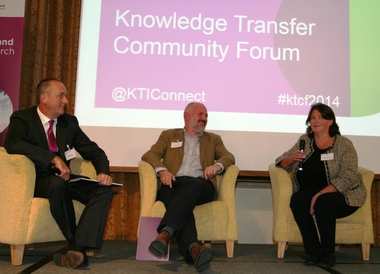Creating and negotiating successful spin-out companies
Ireland’s First Knowlege Transfer Community Forum
 |

Mike Ryan, Irrus Investments; Dan Crowley, ARCH Ventrure Partners and Dr Ena Prosser, Fountain Healthcare Partners
Over 130 people attended Ireland’s inaugural Knowlege Transfer Community Forum in Malahide in October, the first in a series of events designed to cover key issues in knowledge transfer and commercialisation of research.
The event looked at how to create successful spin-out companies and negotiate the right investment. The audience included technology transfer professionals from Ireland’s universities and institutes of technology as well as investors, entrepreneurs and academics.
Alison Campbell, director of Knowledge Transfer Ireland (KTI) said: “We’ll look together as a community of knowledge transfer professionals, industry and investors at what’s working well as best practice. And we will work together as an ecosystem with the aim of making Ireland the best place in Europe for knowledge transfer.”
A discussion on What Investors Want and Why was followed by a case study on Stokes Bio, founded by Mark Davies and Tara Dalton whilst conducting research at the University of Limerick.
Investors were clear that they are looking for strong management teams, considered key to creating successful spin-out companies. They also seek spin-outs that are delivering disruptive technologies. These technologies need to be protected with good IP and address real needs in the market. Investors acknowledged that Technology Transfer Offices (TTOs) should be recognised as an integral part of the value creation process.
Davies and Dalton at Stokes Bio were approached in 2005 by Kernel Capital, which targets intelligence rather than experience when backing early-stage companies. Kernel was willing to take a risk on Stokes Bio despite several setbacks in the first two years. Developing the company’s board structure was one of the most important things Kernel did. University of Limerick for its part was supportive throughout and the deal highlighted the value of the university’s IP due diligence. Stokes was successfully acquired by Life Technologies in 2010 for $44 million.
During the discussion on What HEIs Want and Why, the panel of technology transfer directors agreed that a key issue for Higher Education Institutions (HEIs) is protecting the institution’s reputation. All agreed they were keen to see high quality spin-outs. Promoters need to be incentivised to encourage entrepreneurial initiative and the IP policy at HEIs should be clear about equity positions. Adding performance milestones to a licence can encourage academics to involve management partners early in the spin-out process.
Many technology transfer directors see it as critical that the academic, whether tenured or not, travels with the technology and lends value to the company. Given the sectoral differences between ICT and life sciences, it was suggested that there may be a case for setting aside traditional university policy where academics want to spin out an ICT company.
In the case study on SureWash, Gerard Lacey said patenting and engaging early with the market to allow start-ups to build nascent demand were vital. When he realised he had a patentable research idea, he immediately contacted the technology transfer office at Trinity College Dublin. A high degree of trust between Lacey and Trinity’s TTO meant that things happened quickly and the product was patented almost immediately.
Keynote speaker, Tony Hickson shared his insights from Imperial Innovations, an unusual hybrid of venture capitalist and technology transfer office focused on IP and spin-out formation. He challenged the audience to think more from an investor perspective when developing commercial propositions and acknowledged that TTOs, wherever they may be, often made deal making too complex.
Download the full KTI Report on Creating and Negotiating Successful Spin-out Companies (PDF)
 |
|